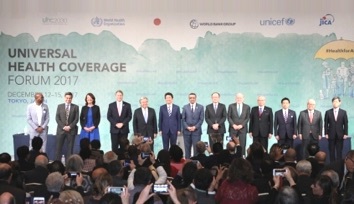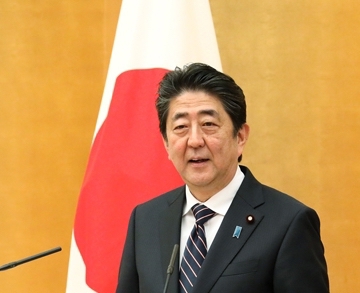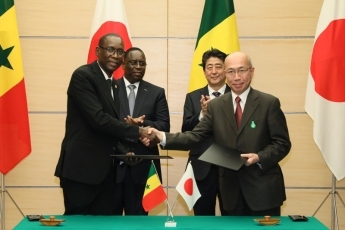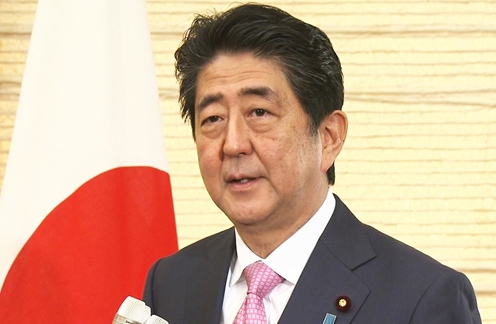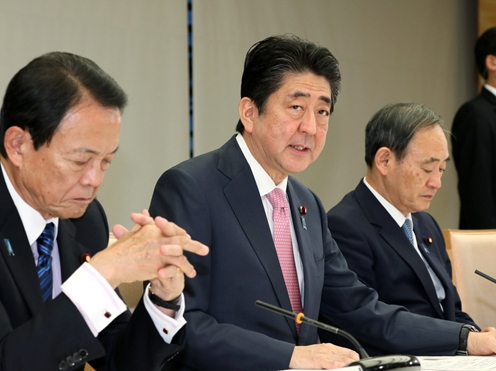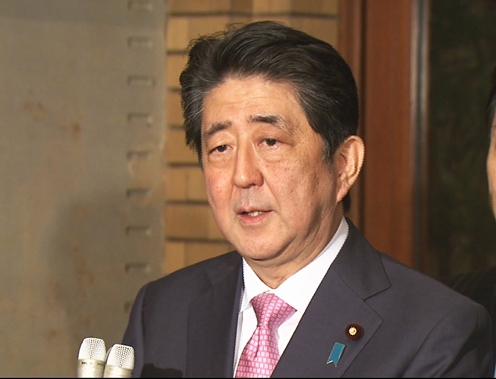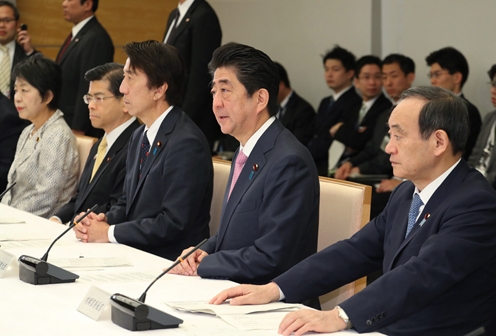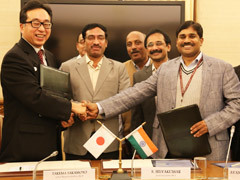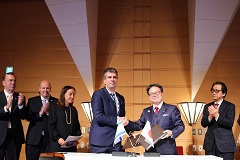Hosting the “UHC Forum 2017”
Foreign Affairs, Thursday, December 14, 2017
1. On December 13 and 14, 2017, an international conference titled “UHC Forum 2017”was held at Tokyo Prince Hotel in Tokyo, Japan, co-organized by the Ministry of Foreign Affairs, the Ministry of Finance, the Ministry of Health, Labour and Welfare, the World Bank, World Health Organization (WHO), the United Nations Children’s Fund (UNICEF), UHC2030, the Japan International Cooeration Agency(JICA).
This conference, attended by Mr. Shinzo Abe, Prime Minister of Japan, brought together high and senior level officials from the governments of various countries, representatives of the international organizations and experts in one location to actively discuss on how to promote universal health coverage (UHC) internationally.
Based on the discussions at the conference, “UHC Tokyo Declaration”(English(PDF)Open a New Window / Japanese (PDF)Open a New Window) was adopted as the commitment to acceralate the efforts towards achieving UHC by 2030 by the co-organisers of the forum.
2. In the high level opening session on December 14, Prime Minister Abe mentioned that Japan has been taking up health as its priority issue and keeping its efforts to implement projects towards the achievement of UHC together with the international community, through the opportunities such as the G7 Ise-Shima Summit and TICAD VI in 2016. He also emphasized that, to acceralate the promotion of UHC, it is crusial to enhance the momentum at the global level towards UHC, promote the coordination among the national governments and donors at the country level, advance the continuous monitoring and evalutation, mobilize resources inside and outside of the country, and promote innovation. Building on these perspectives, Prime Minister Abe further announced that Japan will provide assistance amounting to approximately 2.9 billion dollars in the coming years to push forward the efforts towards UHC by countries and organizations.
3. In the same session, strong commitments to enhance activities towards UHC were expressed by each prominent participant including H.E. Mr. Macky Sall, President of the Republic of Senegal; H.E. Mr. Htin Kyaw, President of the Republic of the Union of Myanmar; H. E. Mr. António Manuel de Oliveira Guterres, Secretary-General of the United Nations; Dr. Jim Yong Kim, President of the World Bank Group; Dr. Tedros Adhanom Ghebreyesus, Director-General of the World Health Organization; Mr. Anthony Lake, Executive Director of UNICEF;Mr. Shinichi Kitaoka, President of JICA; Dr. Yoshitake Yokokura, President of World Medical Association(WMA), President of Japan Medical Association towards promoting UHC.
4. Also in the closing session held on the 14th, Mr. Katsunobu Kato, Minister for Health, Labour and Welfare of Japan explained the overview of the “UHC Tokyo Declaration,”and emphasized that the achievement of UHC leads to improving poverty situation through the redistribution of income and ensuring equity in the society, which ultimately contributes to peace and prosperity of each country of the world, as well as to enhance preparedness against health crises. In the end of the session, Mr. Taro Aso, Vice Prime Minister and Minister of Finance of Japan, made a closing remarks, highlighting that the involvement of each country’s finance minister is essential to secure the finantial recources towards UHC, while it is essential to utilize the international assistance in an effective manner, mobilized through innovative development finance from public and private sector.
5. Furthermore, in the public event held in the evening of 14th, Mr. Kazuyuki Nakane, State Minister for Foreign Affairs of Japan, extended an opening remarks, expressing gratitude for the participating governments, international organizations, development partners and CSOs for their efforts to promote UHC, and Japan’s commitment to support those efforts.
6. On December 13 at the UHC Forum Experts’Meeting, the global situation and progress of UHC and the measures against public health emergencies, as well as various international initiatives related to UHC were introduced to the participants. Besides, thematic breakout sessions were held on strengthening of health systems and health workers, financing for UHC, access to medicine, and health needs in the aging society, all of which are the important challenges to achieve UHC. Minister Kato addressed that towards the sustainable development, it is necessary to strengthen health sysytems themselves while ensuring financial sustainability, and he also introduced Japan’s expertise and experiences towards realizing UHC. In addition, on the 14th , there were vibrant and robust exchanges of views among the participants regarding the policies, methods and measures for achievning UHC by 2030,introduction of good practices from participating countries, and the roles of the development organizations.
Japan’s support for UHC announced at the occasion of the UHC Forum 2017(English (PDF)Open a New Window / Japanese(PDF)Open a New Window)
Ceremony to Commend Leading Companies Where Women Shine
Cabinet Secretariat, Wednesday, December 13, 2017
[Provisional Translation]
On December 13, 2017, Prime Minister Shinzo Abe attended a ceremony to commend leading companies where women shine, at the Prime Minister's Office.
The Prime Minister said in his address,
“I would like to offer my sincere congratulations to the recipients today of these awards to commend leading companies where women shine. Immediately after I became Prime Minister, my administration has raised the flag of active participation by women, positioned it as a core part of our Growth Strategy, and exerted every effort to create an environment in which it is easier for women to work, such as by increasing the capacity of childcare facilities.
However, society could not change if it was only the Government that was working frantically. I believe that if companies also recognize that the active participation of women is absolutely essential for future growth, and change their mindset and actions, then we can make even stronger strides towards the realization of a society in which all women shine.
Furthermore, it is above all important that the mindset of men, including myself, must change, as both Minister Noda and my wife often remind me. I would like to reemphasize this point here, as a reminder also to myself.
Although we are commending leading companies where women shine today, all but one of the company leaders gathered here today are men. Nevertheless, one could conversely view this as proof that the male mindset is really starting to change. I would like to interpret this in a positive light.
In fact, at Takashimaya, the number of female executives among the top management has doubled over the past four years. In the past, I requested Keidanren members to appoint at least one female officer; Takashimaya now has six. I am sure this makes it a department store that understands the perspectives of women. Toho Bank has set the goal of having 100% of eligible male employees taking childcare leave. Thanks to the leadership of its management team it has already hit the 90% mark. Since the child-rearing generation, with their savings and home loans, are probably important customers, the experience of also playing an active part in raising children and sharing the joys and difficulties will surely be of value to male employees when they return to work. That, in turn, will surely lead to corporate growth.
This is the fourth year of these awards. The companies that received awards last year have had more opportunities to promote their companies in the media, and apparently achieved record net profits. In that sense, it can be said that these awards are truly auspicious for the companies that receive them.
Perhaps because of this good reputation, the number of companies recommended for the award has doubled compared to last year. It seems a positive trend is emerging of companies competing over efforts to promote the active participation of women.
In concluding my remarks, I would like the companies in attendance here today, as truly leading companies, to continue to proactively promote the active participation of women, and inspire other companies throughout Japan.
Congratulations once again.”
Exchange of Notes concerning Grant Aid to Senegal
Foreign Affairs, Wednesday, December 13, 2017
1. On December 13, following the Japan-Senegal Summit Meeting held in Tokyo, an exchange of notes concerning three grant aid projects with a total value of 4.17 billion yen took place between Mr. Shigeru Omori, Ambassador Extraordinary and Plenipotentiary of Japan to the Republic of Senegal, and H.E. Mr. Cheikh Niang, Ambassador Extraordinary and Plenipotentiary of the Republic of Senegal to Japan, in the presence of Mr. Shinzo Abe, Prime Minister of Japan, and H.E. Mr. Macky Sall, President of Senegal.
2. The overview of the grant aid projects is as follows:
(1) Support for stable electricity supply in Senegal
This project aims to realize stable electricity supply in eastern Dakar Region by upgrading and strengthening aging electricity supply facilities located in eastern Dakar Region and establishing an electrical distribution network in the surrounding region. As a result of implementing this project, the facilities concerned will newly distribute enough electricity to power approximately 110,000 households, thereby contributing to improving local residents’ lifestyles and economic activity in eastern Dakar Region.
Japan pledged to build quality infrastructure at the Sixth Tokyo International Conference on African Development (TICAD VI), which was held in August 2016, and this grant aid will realize that pledge.
(“The Project for Urgent Rehabilitation and Reinforcement of Energy Transport Network in the Region of Dakar” grant aid; grant amount of 2.934 billion yen)
(2) Support for food security in Senegal
Senegal is facing a chronic grain production shortfall as a result of changes in the amount of rainfall and other factors. With this grant aid, the Government of Japan will implement food assistance by providing approximately 6,000 tons of rice to Senegal, which is facing food shortages, for the purposes of improving food security and improving the state of nutrition in Senegal.
Japan pledged to promote food security in Africa at TICAD VI, which was held in August 2016, and this grant aid will realize that pledge.
(“The Food assistance Programme” grant aid; grant amount of 350 million yen)
(3) Support for training health personnel in Senegal
Strengthening the capabilities of nurses and midwives is an urgent issue in Senegal as Senegal’s maternal mortality ratio (the annual number of maternal deaths per 100,000 live births) is 315, sixty times as high as Japan’s ratio (2016, UNICEF). This project aims to strengthen the capabilities of nurses and midwives by improving the quality and quantity of their practice, which until now has been lacking, as a result of building a clinical practice wing and installing practice equipment at the National School of Sanitation and Social Development, Senegal’s sole health personnel training facility. This will contribute to reducing the maternal mortality ratio in Senegal.
Japan pledged to provide 500 million U.S. dollars of assistance in the health sector and contribute to training 120,000 health personnel over a five-year period at TICAD V, which was held in June 2013, and this grant aid will realize that pledge.
(“The Project for Construction of the Mother and Child Health Application Center of the National School of Sanitation and Social Development” grant aid; grant amount of 886 million yen) (The grant amount has changed to 886 million yen, from the grant amount of 644 million yen when the signing and exchange of notes took place on August 19, 2014)).
[Reference]
The Republic of Senegal covers an area of approximately 197,000 square kilometers (roughly half the area of Japan), and has a population of 15.41 million people and a gross national income (GNI) per capita of 950 U.S. dollars (World Bank, 2016).
Press Occasion on the Cabinet Decisions on the New Economic Policy Package and on the Government Ordinance Stipulating the Date of the Entry into Force of the Special Measures Law on the Imperial Household Law Concerning the Abdication of His Majesty the Emperor and Other Matters
Cabinet Secretariat, Friday, December 8, 2017
[Provisional Translation]
On December 8, 2017, Prime Minister Shinzo Abe held a press occasion at the Prime Minister's Office.
Regarding the Cabinet decision on the new economic policy package, the Prime Minister said,
“Tomorrow we will close the special session of the Diet, which was convened following the general election. I think that the will of the people, as demonstrated in the election, is for the Government to strongly advance our policies atop a stable political foundation. We will move to implement each of the promises we made during the election campaign one by one in order to respond to the mandate given to us by the people.
We are promoting revolutions in productivity and human resources development as two wheels of a cart in tackling the enormous challenge of a declining birthrate and aging population. To that end, a Cabinet decision was made a moment ago to approve the specific economic policy package. For the coming three-year period up to 2020, we will encourage bold investments in human resources and capital, and dramatically increase the productivity of the Japanese economy. Furthermore, looking toward 2020, we will use the budget for our children’s future, and greatly transform the social security system into one that is oriented to all generations.
The Tokyo Olympic and Paralympic Games will be held in 2020. Taking this opportunity, I intend to make 2020 a year in which Japan undergoes a major rebirth. With this determination in mind, I will leverage the confidence placed in us by the people of Japan to realize these major reforms.”
In addition, regarding the Cabinet decision on the Government ordinance stipulating the date of the entry into force of the Special Measures Law on the Imperial Household Law Concerning the Abdication of His Majesty the Emperor and Other Matters, the Prime Minister said,
“The date of the abdication of His Majesty the Emperor and the accession of His Highness the Crown Prince to the Imperial Throne has been decided. The Government will put forth every possible effort to ensure that the abdication of His Majesty the Emperor and the accession of His Highness the Crown Prince to the Imperial Throne takes place without incident amidst the good wishes of all the Japanese people.”
Meeting of the Government and Ruling Parties
Cabinet Secretariat, Friday, December 8, 2017
[Provisional Translation]
On December 8, 2017, Prime Minister Shinzo Abe attended a Meeting of the Government and Ruling Parties at the Prime Minister's Office.
At the meeting, there was discussion on the new economic policy package.
Based on the discussion, the Prime Minister said,
“We are promoting revolutions in productivity and human resources development as two wheels of a cart in tackling the enormous challenge of a declining birthrate and aging population. To that end, a Cabinet decision will be made today to approve the new economic policy package.
To achieve a revolution in productivity, we must thoroughly ensure that the largest corporate profits in history lead to wage increases and capital investments by 2020.
For that purpose, we will lower the corporate tax burden of companies that are making active investments including wage increases by 3% or more, to the OECD average of 25%. Furthermore, for companies that challenge themselves to improve productivity by using innovative technology, we will boldly lower their corporate tax rate to 20%, thereby providing them with an environment in which it is possible to surpass their global competitors. Meanwhile, for major corporations that are reluctant to increase wages and investments despite rising profits, we are considering making them take accountability for this through corporate governance reforms, and also introducing tax measures that encourage decisive management decisions.
In addition, for those small- and medium-size enterprises (SMEs) that are taking on the challenge of making active investments, despite difficult financial conditions, including deficits, we will offer manufacturing and service subsidies through the supplementary budget, and create for the first time a system that will lower their fixed asset tax rate to 0% for three years, while also taking care to ensure the independence of local governments.
I wish to express my heartfelt gratitude for the intensive discussions held in the designated tax commissions of the ruling parties regarding these unprecedented, bold, and focused tax measures, which are befitting of our aim to achieve a revolution in productivity.
In addition, we will carry out structural reforms in line with the Society 5.0 era, including the opening of frequency bands in response to technological innovation, as well as create regulatory sandbox frameworks and submit a bill to the next ordinary session of the Diet so as to connect businesses with innovative ideas.
We will make our utmost efforts to exit deflation by leading the productivity revolution that is emerging around the world by leveraging all possible policies, including tax, budget, and regulatory reform measures, and further expanding the wage increases that we have seen for the past four consecutive years.
Meanwhile, human resources development is a challenge for the longer term. By FY2020, we will establish a foundation for new frameworks not constrained by conventional systems or practices.
First, we will rapidly accelerate the provision of early childhood education for free. We will make all kindergarten, childcare centers, and certified childcare facilities free of charge for all children between three and five years of age. Furthermore, for all children aged from birth to two years old, we will advance efforts to eliminate childcare waiting lists and make childcare free of charge for households eligible to be exempted from municipal tax under this policy package.
Second, we will bring forward the schedule for the Plan for Raising Children with Peace of Mind, which aims to achieve zero children on waiting lists for childcare facilities, and further expand the capacity of childcare facilities by 320,000 children by the end of FY2020. At the same time, we will make further efforts to secure childcare workers and improve employment conditions in light of the wage disparities that exist between the childcare industry and other industries, and we will raise wages in accordance with the National Personnel Authority (NPA) Recommendation. Furthermore, we will raise wages by an additional 1% from April 2019.
Third, we will make tuition fees at universities and other higher education institutions free for children from low-income households, who are truly in need of support. For students from the households eligible to be exempted from municipal tax, if they attend public universities we will waive their tuition and if they attend private universities we will calculate the average tuition fee for private universities and offer a fixed grant. Furthermore, we will fundamentally enhance fund-type scholarships, and implement measures to help cover necessary daily life expenses. We will also offer equivalent support to children from households that are at around the same income level as households eligible to be exempted from municipal tax, in stages, to ensure that the support they receive does not abruptly end.
Fourth, in response to the request for consideration made by Chief Representative Natsuo Yamaguchi of Komeito, we have specified that tuition at private high schools will be made effectively free for households making less than 5.9 million yen a year. To do so, we will first secure the funds made available from revisions to current systems and budgets due to the reallocation of consumption tax revenue. After the reallocation of revenue from consumption tax, by FY2020, the Government as a whole will continue to secure a stable source of funding for this initiative, including using funds obtained from current systems becoming part of regular fiscal year budgets, and ensure that tuition at private high schools will be effectively free. This will be done from the perspective of making it possible for students to receive a broad education, regardless of the economic situation of their household.
Fifth, to reduce to zero the number of people who leave employment to offer nursing care to their family members, we will further improve employment conditions for caregivers. We will invest approximately 100 billion yen in public funds to improve their conditions by October 2019 for certified care workers with 10 years or more of work experience at nursing service companies. This figure is based on a calculation that aims to offer such caregivers an improvement in benefits equivalent to 80,000 yen per month on average.
We will use the revenue created by the increase in consumption tax to 10% to ensure that we have stable financial resources. This increase in revenue will be divided roughly in half between measures to alleviate the financial burden of education, support households raising children, and secure human resources in nursing on the one hand, and fiscal rehabilitation on the other. We will utilize approximately 1.7 trillion yen in new funds for the former set of issues.
In addition, we will increase contributions to children and those raising children by 0.3 trillion yen as a part of major efforts to support the generation raising children throughout our society.
By implementing approximately 2 trillion yen’s worth of policy measures and boldly investing government resources in the generation raising children and children themselves, we will promote a great transformation in the social security system and make it one that is oriented to all generations, allowing both the elderly and the young to live with peace of mind.
I ask for the continued and full cooperation of the leadership of the ruling parties and relevant ministers toward the realization of this new economic policy package.”
Press Occasion on the Summit Telephone Talk with the President of the European Commission
Cabinet Secretariat, Friday, December 8, 2017
[Provisional Translation]
On December 8, 2017, Prime Minister Shinzo Abe held a press occasion at the Prime Minister's Official Residence regarding a summit telephone talk with H.E. Mr. Jean-Claude Juncker, President of the European Commission, from the European Union (EU).
With regard to the conclusion of the Japan-EU Economic Partnership Agreement (EPA), the Prime Minister said,
“A moment ago, we concluded the Japan-EU EPA. In light of this, I held a summit telephone talk with President Juncker of the EU. This was truly remarkable. Japan and the EU will work hand-in-hand to create an economic zone built on free and fair rules. This zone will serve as a model for economic order of the international community in the 21st century. Japan and the EU are embarking on a new era. This EPA will create a huge economic zone with 600 million people and approximately 30 percent of the world GDP. It will act as a new engine for Abenomics, and will soon spring into action. Japan intends to leverage the new potential offered by this EPA to grow our economy and enrich the lives of our people, and the Government will do everything it can to achieve this.”
Headquarters on Creating Dynamism in Agriculture, Forestry and Fishery Industries and Local Communities
Cabinet Secretariat, Friday, December 8, 2017
[Provisional Translation]
Prime Minister Shinzo Abe held the 22nd meeting of the Headquarters on Creating Dynamism in Agriculture, Forestry and Fishery Industries and Local Communities at the Prime Minister's Office.
During the meeting, there was an explanation on the results of deliberation about agriculture, forestry and fishery policy reform, and the Revision of the Plan for Creating Dynamism in Agriculture, Forestry and Fishery Industries and Local Communities was approved.
Following the approval, the Prime Minister said,
“Today we revised the Plan for Creating Dynamism in Agriculture, Forestry and Fishery Industries and Local Communities. Following the agriculture industry reforms, this plan cements the draft of fundamental reforms for the forestry industry, and clarifies the direction for fishery industry reforms.
We will turn the forestry industry into a growth industry while appropriately managing forestry resources. To that end, we will establish a forest bank that will gather and allocate forest management initiatives to ambitious forestry business operators.
We must strike a balance between the appropriate management of fisheries resources and efforts to make the fisheries industry into a growth industry. Based on the direction for fisheries industry reforms that was approved today, I want this Headquarters to aim to compile a draft plan for fundamental reforms that is not constrained by conventional thinking, by next summer.
Furthermore, we must continue to advance agricultural policy reforms, such as reforms on the structure of food distribution channels, including wholesale markets, without letting up.
We will submit the relevant bills to the next ordinary session of the Diet based on the Plan for Creating Dynamism that was revised today. We will work steadily for the realization of policy reforms.
The Abe Cabinet will expand reform efforts across the entirety of the agriculture, forestry and fishery industries, and launch a new era for these industries, whereby young people can work in them with dreams and hopes for their future. I would like all relevant parties to make an even greater effort to achieve this.”
Awarding of the Nobel Peace Prize to the International Campaign to Abolish Nuclear Weapons (ICAN)
(Statement by Foreign Minister Taro Kono)
Foreign Affairs, Sunday, December 10, 2017
1. The award ceremony for this year’s Nobel Peace Prize took place in Oslo on December 10.
2. The Nobel Peace Prize-winning International Campaign to Abolish Nuclear Weapons (ICAN) has to date worked to promote the Treaty on the Prohibition of Nuclear Weapons. Although different from the Japanese government’s approach, we share the common goal of eliminating nuclear weapons. Through this award, we welcome both an increase in global awareness and heightened momentum towards nuclear disarmament and non-proliferation.
3. Over many years, the Hibakusha (Atomic Bomb survivors) of Hiroshima and Nagasaki have conveyed to the world the reality of the atomic bombings to realize a world free of nuclear weapons. The Government would like to express once again its respect for their efforts. It is of great significance that representatives of the Hibakusha and the mayors of Hiroshima and Nagasaki participated in the Nobel Peace Prize award ceremony in recognition of their efforts.
4. In the increasingly severe security environment surrounding Japan, the duty of the Government to protect the lives and properties of its people is becoming ever more important. It is essential to steadily seek ways to advance nuclear disarmament realistically, while responding appropriately to real threats, including North Korea’s nuclear and missile development programs.
5. Furthermore, in the international community, the difference of approaches on how to advance nuclear disarmament has become clear. Japan will persist in rebuilding confidence andtrust between nuclear-weapon and non-nuclear-weapon stateswith different security environments. We will continue advancing realistic and practical efforts also with the engagement of nuclear-weapons states. Through initiatives such as the recent meeting in Hiroshima of the Group of Eminent Persons for Substantive Advancement of NuclearDisarmament, we are committed to steadily advancing efforts towards a world free of nuclear weapons.
Signing of Japanese ODA Loan Agreement with India: Rehabilitating irrigation facilities to contribute to improving the livelihoods of farmers
JICA, Thursday, December 14, 2017
On December 13, the Japan International Cooperation Agency (JICA) signed a loan agreement with the Government of India in Delhi to provide a Japanese ODA loan of up to 21.297 billion yen for the Andhra Pradesh Irrigation and Livelihood Improvement Project (Phase 2) (I).
The project will rehabilitate deteriorating irrigation facilities covering approximately 160,000 hectares in Andhra Pradesh State (“AP”) and support the creation of a comprehensive farming association system for commercial farm associations. These measures will expand the amount of land under irrigation, improve agricultural productivity and build the marketing capacity of farmers, thereby improving the livelihoods of farmers and building an agricultural value chain in the target area. The loan funds will be allocated to the rehabilitation of irrigation facilities and to consulting services (including bidding assistance, construction supervision and technical guidance for farming).
Agriculture thrives in AP (population: 49.57 million people), which is located on the Deccan Plateau in South India. With more than 60 percent of its population engaged in agriculture, the state boasts the top production volume of any state in India in such crops as tomatoes, okra, papayas and corn. AP also has more than 5,700 food processing facilities, the highest number in the country, five seaports and four airports, and thus has favorable conditions for constructing a value chain from the production of crops to production and transportation. While agriculture is thus positioned as a potentially major industry that could support economic development in the state, harvest yields are unstable due to inadequate irrigation facilities and a resulting lack of agricultural water, and quality is also a challenge as harvested products are at risk of damage because crop management and post-harvest processing are inadequate. Without stable quality and quantity, crop harvests cannot form the foundation of a value chain. In order to stabilize agricultural product yields and add high value, an environment with such infrastructure must be established from the production stage through processing and distribution.
It is expected that the project will expand the irrigated land area, improve agricultural productivity and strengthen the marketing capacity of farmers, which will contribute to improved livelihoods for farmers and the creation of an agricultural value chain.
1. Terms and Amount of Loan
Project title
Andhra Pradesh Irrigation and Livelihood Improvement Project (Phase 2) (I)
Amount (million yen)
21,297
Annual interest rate (%)
Project
1.40
Consulting services
0.01
Repayment period (years)
30
Grace period (years)
10
Procurement
General, untied
2. Executing Agency
Water Resources Department, Government of Andhra Pradesh
Address: D. No. 14-7-29, 3rd Floor, Vyshya Bhavan, Namboori Gopalarao Street, Hanumanpet, Vijayawada, Andhra Pradesh, 520003, India
Phone: +91-86-6257-2746, fax: N/A
3. Planned Implementation Schedule
(1) Completion of project: December 2024 – with completion of all project activities
(2) Issuing of letters of invitation for consulting services (including project supervision): Hiring Procedure Underway
(3) Tender announcement of initial procurement package for international competitive bidding on project construction: Domestic procurement is already scheduled, and international competitive bidding for procurement is not planned for this project.
Japan-Israel Economic and Innovation Policy Dialogue (EIPD) and Plenary Meeting of the Japan-Israel Innovation Network (JIIN) Held
METI, Friday, December 1, 2017
On November 29, 2017, in Tokyo, Japan and Israel held the first meeting of the Japan-Israel Economic and Innovation Policy Dialogue(EIPD)and the first plenary meeting of the Japan-Israel Innovation Network(JIIN). These meetings brought together Mr. Hiroshige Seko, Minister of Economy, Trade and Industry, and other officials from the Japanese side and H.E. Mr. Eli Cohen, Minister of Industry and Economy, and other officials from the Israeli side.
At the EIPD meeting, both sides held discussions concerning the fields in which both countries have been advancing cooperation in particular, i.e., cybersecurity, industrial R&D and B-to-B communication, and signed joint minutes of the meeting. At the JIIN plenary meeting, both sides agreed on the TOR(Terms of Reference)in which future policies of activities and action plans are stipulated, and held discussions aiming at further enhancement of Japan-Israel economic cooperation.
1. First EIPD meeting of ministers' level
The first meeting of the EIPD brought together Minister Seko and Minister Cohen. Convening the EIPD meetings is part of the efforts under the Japan-Israel Innovation Partnership program that Minister Seko and Minister Cohen agreed on during Minister Seko's visit to Israel in May 2017. At this meeting, both sides held discussions concerning the acceleration of efforts in three fields:[ⅰ]cybersecurity, [ⅱ]industrial R&D, and[ⅲ]B-to-B communication, and signed joint minutes of the meeting.
2. JIIN plenary meeting
In May 2017, the governments of Japan and Israel agreed on the establishment of the Japan-Israel Innovation Network (JIIN) to accelerate inter-company exchange in both countries. Both sides have been holding proactive discussions since then, and they signed a TOR at the JIIN plenary meeting. The JIIN is a new platform, consisting of governmental organizations, trade promotion organizations and all major economic associations in Japan and Israel as the members. Based on the platform, both sides will organize seminars, workshops and other opportunities in which Japanese and Israeli companies are able to participate, and will strive to advance a variety of efforts, including business-matching, international joint research, support measures for technical demonstration, and dispatching of corporate missions.
Release date
December 1, 2017
Division in Charge
Middle East and Africa Division, Trade Policy Bureau

























